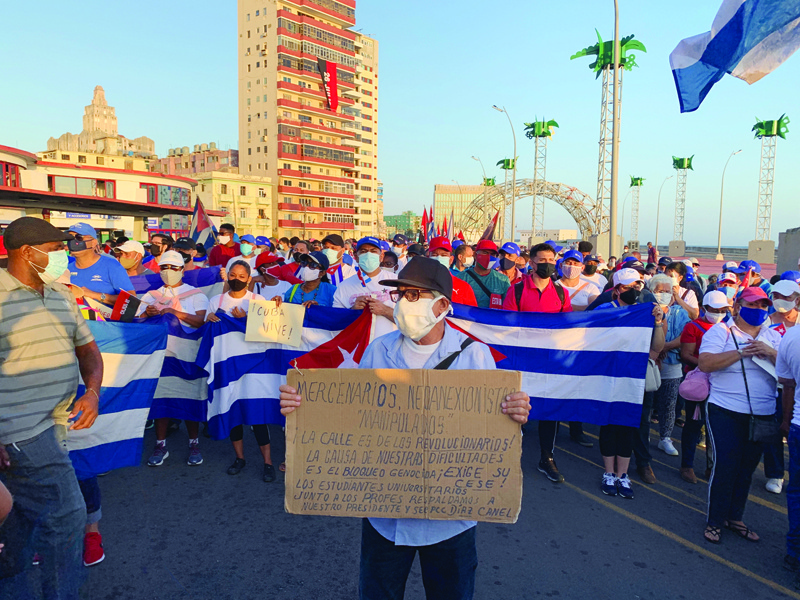WASHINGTON: Hopes that President Joe Biden would ease draconian trade and travel restrictions with Cuba laid down by his predecessor are caught hostage to domestic politics and the vocal Cuban-American community opposed to Havana, analysts say. Biden was vice president when Barack Obama thawed relations with the Caribbean country in 2014, reopening diplomatic missions, cutting back a decades-old embargo, permitting US tourists to visit and imports from the communist-controlled island.
But the support inside the United States for last weekend's anti-government protests across Cuba, and the tight math surrounding Biden's Democrats' control of Congress, explain why he has not reversed the extreme punitive measures against Havana put in place by president Donald Trump over the past four years. Ahead of the presidential election last year, Biden said he would reverse Trump's policies.
But pressed on Thursday about whether he would ease the US embargo, Biden demurred. "Cuba is unfortunately a failed state, and (is) repressing their citizens," he told reporters. "There are a number of things that we would consider doing to help the people of Cuba, but it would require a different circumstance or a guarantee that they would not be taken advantage of by the government."
'Challenge the regime'
After he took office in January many Democrats pressed Biden hard to reverse Trump's policies. On March 2, 80 legislators urged swift action to "return to the diplomatic path charted by the Obama-Biden administration, and pursue an ultimate end to the nearly six-decade-long economic embargo."
They especially wanted him to remove Trump's designation of Cuba as a sponsor of terrorism in January nine days before he stepped down. But the outbreak of protests in Cuba over social and political repression has shifted the equation, with Republicans taking advantage to accuse Democrats of supporting the Havana regime.
"The Biden Administration is betraying the freedom-loving people of Cuba. I fought for Cuba, they didn't," Trump, who still wields substantial political power, said in a statement. The reality, said Dan Restrepo of the Center for American Progress, a thinktank, is that Democrats could need the support of the strongly anti-Havana Cuban American community to retain control of Congress in the mid-term elections in November 2022. "Cuba policy and domestic politics are very hard to separate," he said.
The Democrats lost five congressional seats last year in Florida, two in Cuban-heavy Miami, paring their control of the House of Representatives to a bare margin. So most Democrats are now urging Biden to stay tough on Cuba policy-essentially to leave Trump's policies in place. "We have to challenge the regime," Democratic Senator Bob Menendez, chair of the powerful Senate Foreign Relations Committee, told MSN. "The regime has to change in order to let the Cuban people thrive," said Menendez, whose parents were Cuban immigrants and who counts a large Cuban population among his New Jersey constituency.
"We stand in solidarity w/ thousands of peaceful protestors all over Cuba who are challenging its repressive regime. May their courage and this historic moment bring about real change," tweeted Debbie Wasserman Schultz, a senior Democrat legislator from south Florida. - AFP



